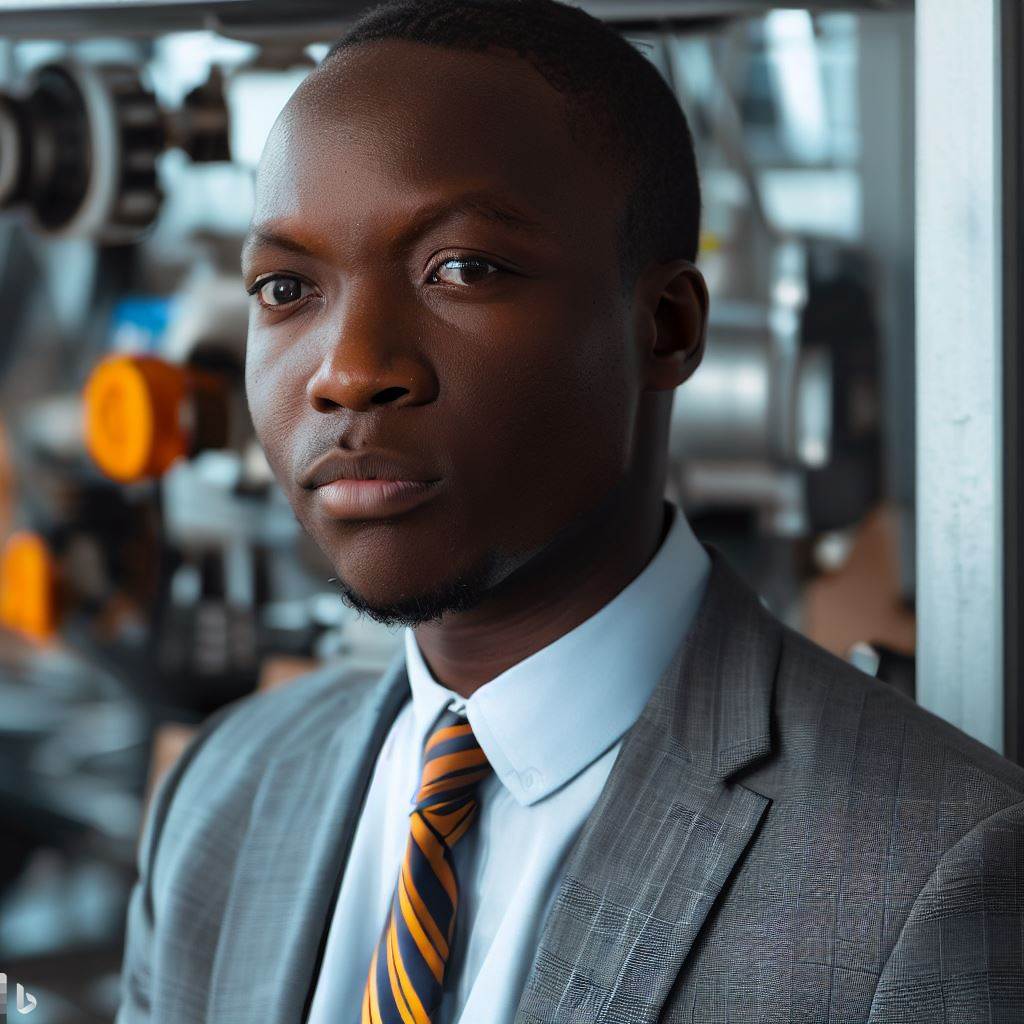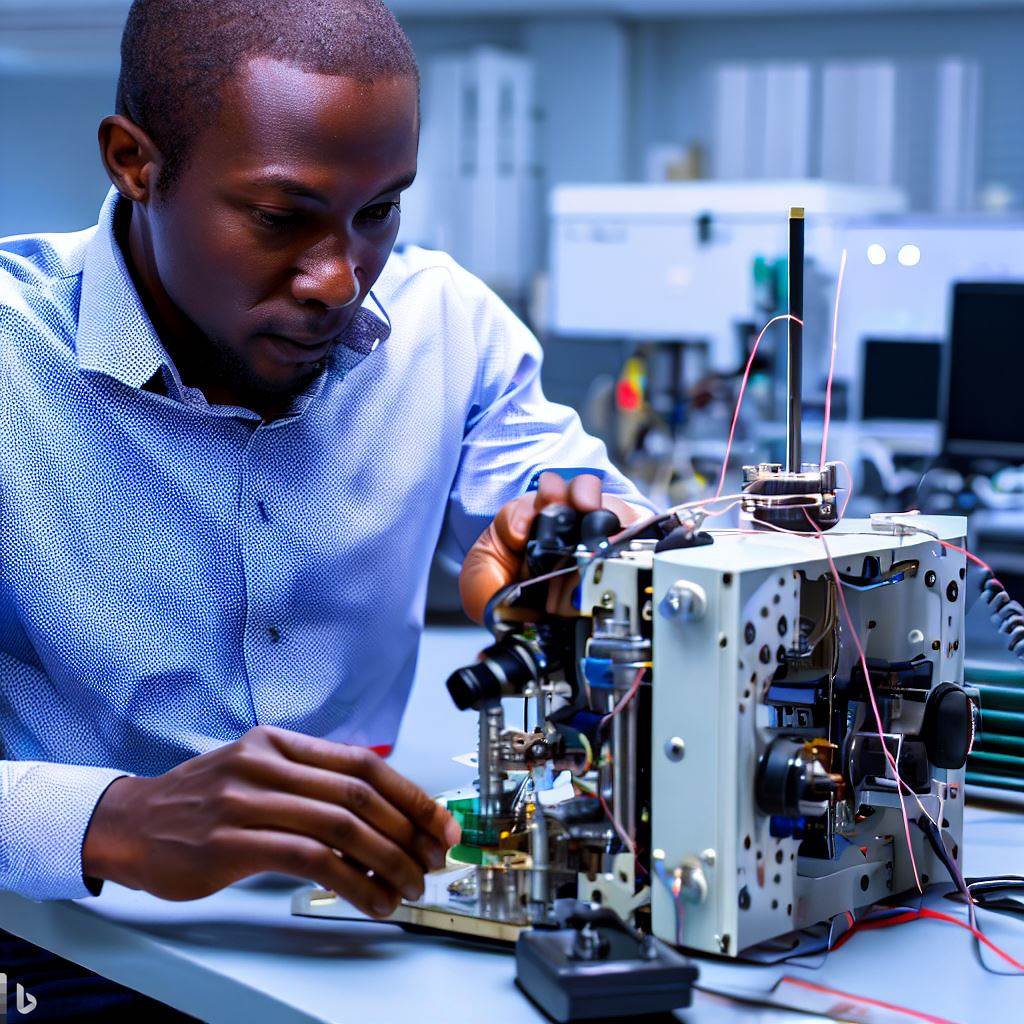Introduction
Opto-mechanical engineers play a vital role in Nigeria by combining optical and mechanical principles to design and develop innovative solutions.
Their importance lies in the advancement of technology, healthcare, and several other industries.
Purpose of the blog post
This blog post aims to shed light on the significance of opto-mechanical engineers in Nigeria. It will explore their contributions and the impact they have on various sectors.
Additionally, it will discuss the challenges they face and the scope of opportunities in this field.
Importance of opto-mechanical engineers in Nigeria
Opto-mechanical engineers in Nigeria are crucial for the growth of industries such as telecommunications, automotive, and renewable energy.
Their expertise in designing optical systems ensures the efficiency and accuracy of these industries. They contribute to the development of advanced communication networks, optical sensors, and imaging devices.
In the healthcare sector, opto-mechanical engineers play a vital role in developing medical imaging devices such as ultrasound machines, endoscopes, and laser systems.
These devices assist in accurate diagnosis and treatment, saving lives and improving healthcare in Nigeria.
Opto-mechanical engineers also contribute to the growth of the entertainment industry, designing state-of-the-art cameras for photography, cinematography, and virtual reality.
Their innovative designs enhance the visual experience for consumers and professionals alike.
Despite their significance, opto-mechanical engineers in Nigeria face challenges such as limited resources and lack of awareness about their field.
However, with the growing demand for advanced technology, there are ample opportunities for them to thrive and make a significant impact on the nation’s development.
In the end, opto-mechanical engineers in Nigeria are crucial for technological advancements, healthcare improvements, and overall industrial growth.
This blog post aims to highlight their importance and encourage further exploration of this field for aspiring engineers.
Background on opto-mechanical engineering in Nigeria
Opto-mechanical engineering flourishes in Nigeria due to rising demand for optical devices in telecoms, medical, and manufacturing.
Transform Your Career in Nigeria
Discover unmatched expertise with our personalized Career Consulting service. Navigate Nigeria’s job market with a strategy tailored just for you.
Get StartedEngineers combine optics and mechanics to create advanced optical systems, including lenses, mirrors, and cameras.
These components are vital for capturing, transmitting, and analyzing optical information across industries.
Nigeria experiences a surge in optical device demand, driven by the telecommunications sector’s need for high-speed data transmission.
Opto-mechanical engineers play a crucial role in this technological revolution.
They develop innovative solutions for the industry by designing and optimizing optical networks to ensure efficient data transmission over long distances.
The significance of opto-mechanical engineering in Nigeria goes beyond the telecommunications sector.
In the medical field, optical devices are used for various purposes, including diagnostics, imaging, and surgical procedures.
Opto-mechanical engineers play a critical role in developing medical devices that are accurate, reliable, and cost-effective.
Furthermore, the manufacturing industry in Nigeria is also benefiting from advancements in opto-mechanical engineering.
Optical systems are used for quality control, precision measurements, and non-destructive testing.
Opto-mechanical engineers collaborate with manufacturers to enhance productivity and ensure product quality, fostering growth in Nigeria.
Educational institutions and research centers support this expansion. Universities offer specialized optical engineering courses, training skilled professionals.
Research institutions encourage collaboration and innovation, driving field advancements.
The future of opto-mechanical engineering in Nigeria appears promising due to continuous technological development and growing demand for optical devices.
The field is expected to expand further, providing new opportunities for engineers and businesses. Overall, opto-mechanical engineering in Nigeria plays a vital role across various industries.
It demands skilled engineers capable of designing and developing advanced optical systems.
Nigeria’s embrace of technology and innovation will further elevate the significance of opto-mechanical engineering in shaping its future.
Read: International Exposure for Nigerian Flight Engineers
Overview of leading opto-mechanical engineers in Nigeria
The field of opto-mechanical engineering in Nigeria has seen remarkable growth and development in recent years. Several highly accomplished engineers have emerged, making significant contributions to the field.
This article highlights some of these leading opto-mechanical engineers and sheds light on their work and accomplishments.
Dr. Isabella Adekunle
Dr. Isabella Adekunle is a renowned opto-mechanical engineer with a Ph.D. in Optical Engineering from the University of Lagos.
Her research and work focus on the development of advanced optical systems for aerospace applications.
Dr. Adekunle’s innovative designs have improved the efficiency and reliability of optical sensors used in space exploration missions.
Her contributions have significantly enhanced Nigeria’s presence in the global space industry.
Publish Your Professional Profile, Business or Brand
Showcase your expertise, gain trust, and boost visibility instantly on Professions.ng.
Publish NowEngr. Umar Ibrahim
Engr. Umar Ibrahim is a leading opto-mechanical engineer who has made substantial contributions to the field of remote sensing.
He has been instrumental in developing advanced imaging systems for satellite-based Earth observation.
Engr. Ibrahim’s work has revolutionized Nigeria’s ability to monitor and manage natural resources, agriculture, and environmental issues.
His expertise has also played a crucial role in disaster management and emergency response.
Prof. Stephen Okonkwo
Prof. Stephen Okonkwo is a distinguished opto-mechanical engineer and academician. His research centers around the design and optimization of optical systems for telecommunications.
Prof. Okonkwo’s breakthroughs in fiber optics have greatly improved the efficiency and performance of Nigeria’s telecommunication networks.
His work has contributed to bridging the digital divide and promoting information and communication technology in Nigeria.
Relevance and impact of their contributions
The contributions of these leading opto-mechanical engineers in Nigeria have far-reaching relevance and impact.
Their innovative designs and research have not only advanced the field of opto-mechanical engineering but have also brought numerous benefits to various sectors.
Firstly, their work has significantly contributed to Nigeria’s space industry.
By developing advanced optical systems for aerospace applications, Dr. Isabella Adekunle and her counterparts have enhanced Nigeria’s ability to explore space and engage in satellite-based missions.
Secondly, their contributions in remote sensing and imaging systems have revolutionized Nigeria’s monitoring and management of natural resources and environmental factors.
Engr. Umar Ibrahim’s expertise has allowed for accurate data collection and analysis, aiding in sustainable resource management and disaster response.
Thirdly, the research and advancements made by Prof. Stephen Okonkwo in fiber optics and telecommunications have had a profound impact.
Nigeria’s telecommunication networks have become more efficient and reliable, leading to improved connectivity, economic growth, and enhanced access to information and communication technology.
In essence, the leading opto-mechanical engineers in Nigeria, such as Dr. Isabella Adekunle, Engr. Umar Ibrahim, and Prof. Stephen Okonkwo, have made remarkable contributions to their field.
Their work has not only advanced the science and technology of opto-mechanical engineering but has also brought tangible benefits to Nigeria’s space industry, resource management, disaster response, and telecommunication networks.
Their achievements serve as inspiration for future generations of engineers in Nigeria and beyond.
Read: Licensing and Certification for Opto-Mechanical Engineers in Nigeria
Interview with Dr. Isabella Adekunle
Dr. Isabella Adekunle is one of the leading opto-mechanical engineers in Nigeria.
With a strong background in both optics and mechanical engineering, he has been at the forefront of developing innovative solutions in the field.
Introduction and background of Dr. Isabella Adekunle
Dr. Isabella Adekunle completed their bachelor’s degree in Mechanical Engineering from a prestigious university in Nigeria.
During their undergraduate studies, they developed a keen interest in optics and decided to pursue further education in the field.
They went on to earn a master’s degree in Opto-Mechanical Engineering from an internationally renowned university.
After completing their education, He joined a leading optical technology company in Nigeria.
They quickly rose through the ranks due to their exceptional skills and knowledge in both mechanical engineering and optics.
With years of experience in the industry, Dr. Isabella Adekunle has established themselves as a go-to expert for various opto-mechanical projects and challenges.
Highlights of the interview regarding their work, challenges, and experiences
During the interview, Dr. Isabella Adekunle discussed the wide range of projects they have worked on throughout their career.
They highlighted the importance of seamlessly integrating optical components into mechanical systems, emphasizing the need for precision and attention to detail.
He stressed that their work requires a deep understanding of both fields and the ability to bridge the gap between them.
One of the challenges he mentioned was the lack of awareness about the field of opto-mechanical engineering in Nigeria.
They emphasized the importance of creating awareness and encouraging more students to pursue this field, as it has immense potential for growth and innovation in various industries.
He also shared some of their most notable experiences, such as designing and developing a high-performance optical system for a satellite project.
They explained how this project pushed their limits and taught them valuable lessons about problem-solving, teamwork, and perseverance.
Dr. Isabella Adekunle expressed their passion for pushing boundaries and constantly seeking new ways to optimize opto-mechanical systems.
Key takeaways and insights from Dr. Isabella Adekunle perspective
- Opto-mechanical engineering is a field that combines the principles of optics and mechanical engineering.
- Precision and attention to detail are crucial in integrating optical components into mechanical systems.
- Creating awareness about opto-mechanical engineering in Nigeria is essential for its growth and development.
- Challenging projects provide valuable opportunities for growth and learning in the field.
- His passion for pushing boundaries and optimizing opto-mechanical systems is evident in their work.
Basically, Dr. Isabella Adekunle interview shed light on the world of opto-mechanical engineering in Nigeria.
Their expertise, experiences, and insights emphasized the importance of this field in various industries and the need for further development and awareness.
His dedication to pushing boundaries and striving for excellence serves as an inspiration to aspiring opto-mechanical engineers in Nigeria and beyond.
Read: Flight Engineer Certification: A Nigerian Perspective

Interview with Engr. Umar Ibrahim
Introduction and Background of Engr. Umar Ibrahim
Engr. Umar Ibrahim is a seasoned opto-mechanical engineer with over fifteen years of experience in the field.
Publish Your Professional Profile, Business or Brand
Showcase your expertise, gain trust, and boost visibility instantly on Professions.ng.
Publish NowHe graduated with a Bachelor’s degree in Mechanical Engineering from a prestigious university in Nigeria and later pursued a Master’s degree in Optics and Photonics.
He is highly regarded in the industry for his expertise and innovative solutions in opto-mechanical engineering.
Highlights of the Interview regarding their Work, Challenges, and Experiences
Engr. Umar Ibrahim shared that his work involves designing and developing optical systems for various applications. He emphasized the importance of precision and accuracy in opto-mechanical engineering.
Discussing the challenges, he faces include sourcing high-quality components and dealing with tight project deadlines.
He highlighted the need for continuous learning and staying updated with the latest technological advancements in the field and shared his experiences of working on complex projects that required integrating optics with mechanical systems.
He spoke about collaborating with cross-functional teams, including optical scientists, electrical engineers, and software developers.
The interview also touched upon the importance of effective communication and teamwork in the success of projects.
Engr. Umar Ibrahim mentioned that one of the most rewarding aspects of his work is seeing his designs come to life and solving real-world problems.
He also expressed his passion for mentoring young engineers and encouraging them to explore the field of opto-mechanical engineering.
Key Takeaways and Insights from Engr. Umar Ibrahim Perspective
Engr. Umar Ibrahim provided valuable insights during the interview, shedding light on the field of opto-mechanical engineering in Nigeria. His key takeaways can be summarized as follows:
- Precision and accuracy are fundamental in opto-mechanical engineering.
- Continuous learning and staying updated with technological advancements are crucial.
- Collaboration with cross-functional teams is essential for successful project execution.
- Effective communication and teamwork play a vital role in project success.
- Mentoring young engineers and encouraging their exploration in opto-mechanical engineering is fulfilling.
Engr. Umar Ibrahims expertise and experiences highlight the significance of opto-mechanical engineering in various industries in Nigeria.
His insights serve as an inspiration for aspiring engineers and emphasize the importance of continuous learning and innovation in the field.
Read: Career Advancement Opportunities for Flight Engineers in Nigeria
Interview with Prof. Stephen Okonkwo
Introduction and background of Prof. Stephen Okonkwo
Prof. Stephen Okonkwo a highly accomplished professional in the field of Opto-Mechanical Engineering, has been working in Nigeria for the past 15 years.
With a Bachelor’s degree in Mechanical Engineering and a Master’s degree in Opto-Mechanical Systems, he has gained extensive expertise in designing and developing optical systems for various industries.
Highlights of the interview regarding their work, challenges, and experiences
He expressed their passion for creating innovative optical solutions to address complex challenges faced by industries in Nigeria.
They highlighted the importance of collaboration between mechanical engineers and opticians to achieve optimal results in their projects.
Prof. Stephen Okonkwo discussed their involvement in the development of cutting-edge optical devices, such as high-resolution lenses and advanced laser systems.
They mentioned the challenges of sourcing quality optical components locally and the need to import them, increasing project costs.
Prof. Stephen Okonkwo emphasized the significance of staying updated with the latest advancements in opto-mechanical engineering and attending conferences and workshops regularly.
They shared an interesting experience of working on a project that required integrating optics into a robotic arm for an automated inspection system.
He spoke about the satisfaction they derive from solving complex problems and seeing their optical systems improve the efficiency of various industrial processes.
They also discussed the importance of documenting their work to ensure knowledge transfer and effective maintenance of the optical systems.
He highlighted the need for more investment in research and development in Nigeria to foster innovation in the field of opto-mechanical engineering.
Key takeaways and insights from Prof. Stephen Okonkwo perspective
- Opto-Mechanical Engineering plays a crucial role in various industries in Nigeria.
- Collaboration between mechanical engineers and opticians is essential for successful project outcomes.
- Importing optical components increases project costs, indicating the need for local manufacturing capabilities.
- Continuous learning and staying updated with advancements in the field are vital for success.
- The integration of optics into automation systems can significantly enhance efficiency and accuracy.
- Documenting work is essential for the long-term maintenance and effective knowledge transfer.
- Increased investment in research and development will drive innovation and growth in Nigeria’s opto-mechanical sector.
Therefore, Prof. Stephen Okonkwo expertise and insights shed light on the fascinating world of opto-mechanical engineering in Nigeria.
Their passion, dedication, and commitment towards solving complex challenges through innovative optical solutions inspire both aspiring and experienced engineers in the field.
By fostering collaborations, investing in local manufacturing capabilities, and promoting research and development, Nigeria can unlock the vast potential of opto-mechanical engineering and drive technological advancements in the country.
Common Themes and Findings from the Interviews
During the interviews with leading opto-mechanical engineers in Nigeria, several common themes and findings emerged.
These findings shed light on the experiences and challenges faced by these engineers in their field.
Identifying Shared Experiences and Challenges in the Field
- Continuous Learning: All the engineers emphasized the need for continuous learning in the ever-evolving field of opto-mechanical engineering.
- Technological Advancements: The engineers highlighted the importance of keeping up with the latest technological advancements and incorporating them into their work.
- Collaboration: Collaboration with multidisciplinary teams and experts was identified as key in successfully solving complex engineering problems.
- Maintaining Precision: Precision and attention to detail were recurring themes, as even minor errors could have significant consequences.
- Adapting to Change: The engineers discussed the need to be adaptable and flexible in the face of rapidly changing technologies and market demands.
Reflecting on the Uniqueness of Each Engineer’s Journey
While the common themes provided insights into the field as a whole, it is essential to acknowledge the uniqueness of each engineer’s journey.
- Diverse Backgrounds: Each engineer came from a different educational background, including mechanical engineering, physics, and optics, among others.
- Varied Specializations: The engineers specialized in various aspects of opto-mechanical engineering, such as lens design, optical system integration, and instrument calibration.
- Industry Involvement: Some engineers had extensive experience in the industry, working with leading companies, while others focused more on research and academia.
- International Exposure: A few engineers had the opportunity to study or work abroad, gaining exposure to international best practices and perspectives.
- Passion and Motivation: Each engineer shared a deep passion and motivation for their work, which fueled their dedication to overcoming challenges and achieving excellence.
The diversity in backgrounds, specializations, and experiences contributed to the richness of insights gained from these interviews.
It further highlighted the multidimensional nature of the opto-mechanical engineering field in Nigeria.
Through the interviews with leading opto-mechanical engineers in Nigeria, common themes and findings emerged.
Continuous learning, technological advancements, collaboration, precision, and adaptability were identified as shared experiences and challenges in the field.
However, it was equally important to acknowledge the uniqueness of each engineer’s journey, characterized by diverse backgrounds, varied specializations, industry involvement, international exposure, and a strong passion for their work.
These interviews shed light on the ever-evolving and multidimensional nature of opto-mechanical engineering in Nigeria.
By understanding the common themes and appreciating the individual journeys, it becomes clear that the field offers vast opportunities for growth, innovation, and impactful contributions to the scientific and technological landscape.
Find Out More: Opportunities in Nigeria’s Automation & Robotics Sector
Conclusion
The interviews with leading opto-mechanical engineers in Nigeria have shed light on the significance of this field in the country.
From the discussions, it is evident that opto-mechanical engineering plays a crucial role in various sectors, such as telecommunications, healthcare, and manufacturing.
Publish Your Professional Profile, Business or Brand
Showcase your expertise, gain trust, and boost visibility instantly on Professions.ng.
Publish NowThese engineers highlighted the challenges they face, including the lack of adequate funding, limited infrastructure, and a shortage of skilled professionals.
Despite these challenges, the insights gained from the interviews indicate that there is a growing interest and potential for opto-mechanical engineering in Nigeria.
The engineers emphasized the need for increased investment in research and development, as well as collaborations with international partners.
They also highlighted the importance of education and training to ensure a skilled workforce that can drive innovation and contribute to the growth of the field.
In short, the future of opto-mechanical engineering in Nigeria looks promising, with opportunities for advancements and contributions to various industries.
However, it will require the support of the government, private sector, and educational institutions to overcome the challenges and fully harness the potential of this field.




